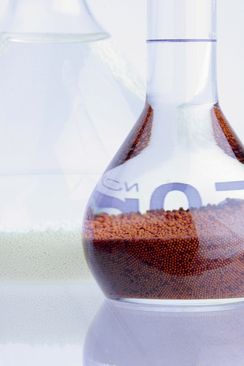Asia
EMEA

LANXESS Canada Contacts
Contact our Sites in Canada
Media Inquiries
General Inquiries
Please click here to e-mail LANXESS Canada with product inquiries and general requests.
Global Press Releases
2010-05-17
Chemistry and know-how in the fight against arsenic in drinking water
LANXESS presents latest research findings at international congress in Taiwan
Water is the most important substance of all to life. Specialty chemicals group LANXESS is highlighting the overriding importance of this substance with a variety of activities complementing its chemistry and know-how as part of its "Year of Water 2010" initiative. This includes the company’s contribution to the 3rd International Congress on Arsenic in the Environment, which takes place in Tainan, Taiwan, from May 17 to 21.
In his congress presentation, LANXESS chemist Dr. Stefan Neumann, Manager Technical Marketing and Chemicals Purification at the Ion Exchange Resins (ION) business unit, showcases recent research using a new hybrid adsorber for treating drinking water. Plastic-based Lewatit FO 36 grade hybrid adsorber, modified with a special, nanoscale iron oxide, allow highly efficient and selective removal of arsenic from drinking water. Arsenate and arsenite ions are attached via a covalent bond to the iron oxide surface and are thereby removed from the surrounding water. Product development was successfully completed in 2008 and the experts involved were honored the following year with the LANXESS innovation award in the ecology category. LANXESS is one of the world’s leading manufacturers of ion exchange resins and expects to see above-average growth in the future, particularly in water treatment.
“We have presented a technical concept in Taiwan to also remove arsenic from water containing large amounts of silica. This was previously only possible to a limited extent,” says Neumann, explaining one of the current research areas. Laboratory tests also showed that the hybrid adsorber can be used to fill filter cartridges and – as in standard cartridges for softening water – be deployed on a localized basis in the home or on the move. One single cartridge containing only around 0.1 liter of adsorber was used to treat around 1,200 liters of water over three months. This cut arsenic content from approximately 100 ppb (100 micrograms per liter) to less than 10 ppb.
Lewatit FO 36 ensures reliable compliance in many cases with the maximum permitted value of arsenic in drinking water of 10 ppb recommended by the World Health Organization (WHO) and already laid down in numerous countries. In parts of the United States, Chile, the United Kingdom and other countries, higher concentrations occur in groundwater and surface water. This is mainly due to the washing out of natural mineral sources and, to a lesser extent, to anthropogenic influences such as wastewater from mining and industry. Arsenic is highly toxic to higher organisms and humans. Changes to the skin and other damage to health, culminating in cancer, are particularly prevalent in the case of long-term exposure. Yet many millions of people throughout the world remain dependent on drinking water that contains more than 50 ppb arsenic. This is the case in countries such as India, China and Bangladesh.
The hybrid adsorber developed by LANXESS can provide an effective remedy in these instances. As a dust-free, flowable substance with a standard grain size and excellent mechanical stability, the product is perfectly tailored to the requirements of industrial water treatment. After the saturation limit has been reached, it can be regenerated with lye, enabling it to be used repeatedly in an eco-friendly, cost-effective way. Lewatit FO 36 is currently being used at a total of three facilities in Italy and Germany to remove arsenic from well water. This water can then be safely used as drinking water by several thousand people.
An overview of research findings and field tests on Lewatit FO 36 is provided by a new article that will shortly be appearing in Volume 2 of the series “The Global Arsenic Problem: Challenges for Safe Water Production”, entitled “Arsenic in the Environment”. This multi-volume monograph focuses on the “insidious poison” arsenic and investigates appropriate measures to remove it from the food chain, particularly from drinking water.
Further technical details on Lewatit FO 36 and its use in removing arsenic from drinking water are included in a brochure available for download at www.lewatit.com.
With granulated iron oxide hydroxides from the Bayoxide E33 series, LANXESS, one of the world’s leading manufacturers of inorganic pigments, offers a further effective alternative for removing arsenic from drinking water following a similar principle. In conjunction with a solid bed adsorber technology, these granules have already been successfully used around the world for many years.
#LANXESS is a leading specialty chemicals company with sales of EUR 5.06 billion in 2009 and currently around 14,300 employees in 23 countries. The company is represented at 42 production sites worldwide. The core business of LANXESS is the development, manufacturing and marketing of plastics, rubber, intermediates and specialty chemicals.
- Gallery



